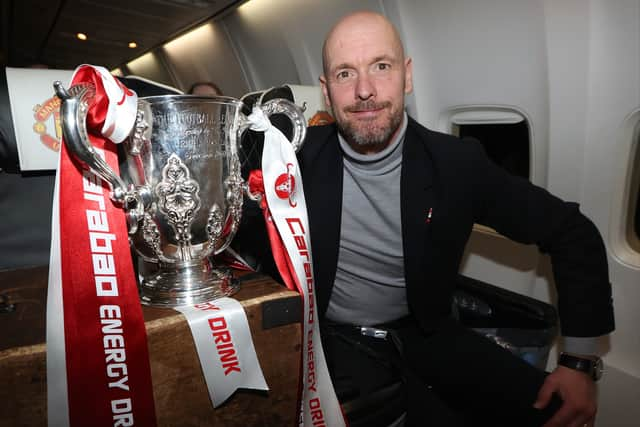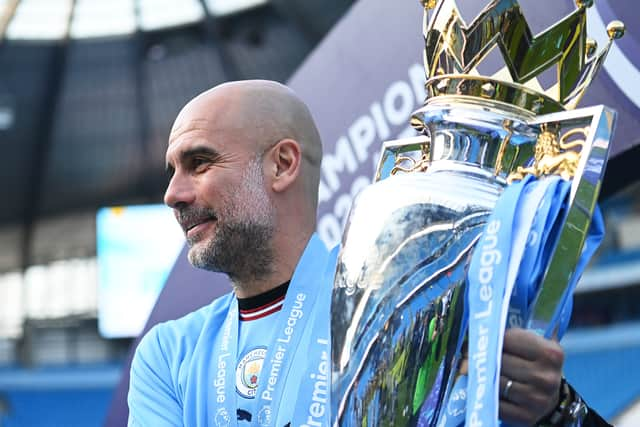Can Man Utd deny City their defining moment in the FA Cup final - and is it more important than winning?
and live on Freeview channel 276
Arsenal have the Invincibles. Liverpool have Istanbul. Manchester United have the treble. As it stands, Manchester City don’t have it yet – the moment that defines and elevates their period of dominance beyond the Honours section of their Wikipedia page, the achievement that sets their star in the firmament for good.
I believe Erik Ten Hag when he says that his United side aren’t motivated by the possibility of spoiling City’s treble: “It is not about stopping City. It is about us winning the Cup.”
Advertisement
Hide AdAdvertisement
Hide AdBut I do not entirely believe any Manchester United fan who would claim the same. It is one thing to be a professional on the payroll at Old Trafford – but it is another to be a member of the masses in the stands who experienced the years of superiority they enjoyed under Sir Alex Ferguson. For all the relative tumult of the last few years, they have still been raised to believe that their side has a divinely ordained right to silverware – and to be able to prove, on paper, that their team is the best in the land. To live in a time when trophies are an occasional treat and when that lot next door are the dominant force in English football must be an endless torment.


As the blue moon has waxed, United’s star has waned. They have been largely helpless to prevent Pep Guardiola’s precision-engineered juggernaut from levelling the landscape around them. A League Cup, a first trophy in six years, is a small start but not a satisfactory return. Even an FA Cup, their first since beating Crystal Palace in 2016, would not come close to wiping out the red in their ledger.
Nor would it suggest, for all that Ten Hag’s side have improved, that the gulf separating the two halves of Manchester is any narrower. United finished the league campaign 14 points behind their rivals, and no result on Saturday, even the most one-sided of thrashings in their favour, would lead anyone to believe that City’s primacy has been truly challenged. It may take many more years of improvement and spending before they can say that they stand on the same level as Guardiola’s team, and the history books will reflect that. But to deny Guardiola his crowning glory, the treble that they has been spoken about ceaselessly since it began to look like a serious possibility, would be a sweet measure of revenge.
That City desperately want that permanent monument to this superlative team is unquestionable. They celebrated their FA Cup win in 2019 with “four-midable” t-shirts, rather optimistically including the Community Shield alongside their Premier League and League Cup trophies. Winning two major trophies, one halfway-important cup and a glorified friendly was no mean feat, of course, but it nevertheless stood so much in the shade of United’s own treble 20 years earlier that it barely registered for most football fans. That late comeback in Barcelona still causes everything City have done to seem slightly pallid by comparison. City winning the same treble this season wouldn’t just pull everything they have won these past few years blinking into the sunlight, it would render United’s own golden hour a little more lightweight, its value reduced slightly, but significantly, by the lost scarcity value.
Advertisement
Hide AdAdvertisement
Hide AdOf course, lifting the Cup would be lovely. It would be a tangible, glittering symbol of how much they have improved since Ten Hag took the reins. They are a better team since he took over – that is beyond question – and it has been a fine first season for the most part, albeit one with plenty of moments where the Manchester United of Moyes, Van Gaal, Mourinho, Solskjaer and Rangnick was still visible – the 6-3 defeat at the Etihad, the bruising 4-0 bashing at the hands of Brentford, and worst of all the humiliating 7-0 annihilation they experienced against Liverpool.
That there is still substantial room for improvement – 14 points’ worth of improvement, to use the yardstick set down by City – is obvious and unsurprising, and in an era when the league means more than any domestic cup, even winning both of them wouldn’t entirely offset the evident fact that United are still helplessly adrift of those noisy neighbours, reduced to occasional complaints to the council about the volume of their relentless parties. This is a strange modern world where, if City were to finish the season with only the Premier League to their name, they would still have the better share of the local bragging rights. The FA Cup is important, still, but not half so much as the league.


Every era of dominance comes to an end, just as the Ferguson years closed out with that one last title win. One day, the City machine will find that the maintenance standards have slipped and the engineering is a little lacking, and they will be on a downswing of some kind. Guardiola will leave some day, and perhaps his replacement will not be up to scratch. Even the most extraordinary teams come a cropper sooner or later. Manchester United have the money, manager and weight of history to be ready in the wings if that happens in the near future, although they will scarcely be alone in that given the competitive and financial depth of the Premier League.
The fact remains that until that opportunity presents itself, United are in the shadow of City. They are the second-best team in Manchester. Winning the FA Cup will give their supporters a great excuse to paint Piccadilly red for a weekend. For a few days, it will mean the world, but it will not budge the balance of power one inch, especially given that City could easily win the Champions League the very next Saturday.
We want your feedback on 3 Added Minutes - details here
Advertisement
Hide AdAdvertisement
Hide AdBut what winning the FA Cup final would also do is rob City of the defining moment their legacy needs to be complete. Without this treble – or some equivalent in the next couple of years – then when we look back, Guardiola’s period of primacy will have that little less sheen than Ferguson’s did, and as the balance of power see-saws back and forth over the decades, it would be that night in 1999 that stands out as the pinnacle of Mancunian footballing achievement. Right now, City have everything they could ever want – except that.
Comment Guidelines
National World encourages reader discussion on our stories. User feedback, insights and back-and-forth exchanges add a rich layer of context to reporting. Please review our Community Guidelines before commenting.
